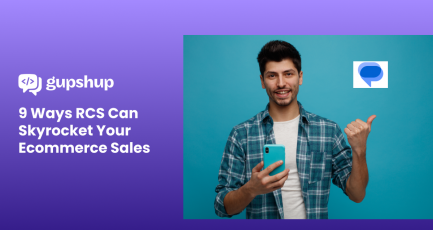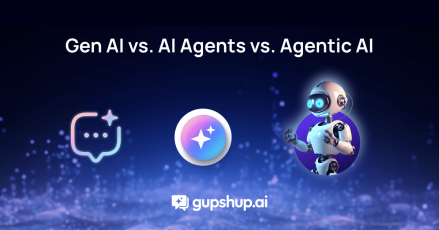Healthcare Marketing Chatbot: Redefining Patientcare with Conversational AI

Introduction
Since its beginning, healthcare has strived to provide the best possible patient care. While technology has transformed treatment methods, the core mission remains unchanged. In the field of extreme service in patient care, there is nobody like chatbots. Statista reports that healthcare organizations adopting conversational AI and automation went from 53% in 2019 to 90% in 2020. Equipped with advanced AI and NLP, these bots upgrade patient experience and ease healthcare professionals’ workload.
Moreover, integrating them into widely used platforms like WhatsApp API can only amplify their impact. The National Centre for Biotechnology Information demonstrates healthcare chatbots showing that 78% of physicians use bots for appointment scheduling. This makes these WhatsApp bots extremely intelligent and compatible with patient requests.
Curious to know how they work? Let’s find it out together!

What is a Healthcare Chatbot?
Healthcare chatbots are AI-powered intelligent helpers that ease the struggle of patience by getting quick and convenient assistance from medical centers and medical professionals.
With the integration of WhatsApp, patients can now easily get answers to common questions, book appointments, receive reminders, and more. This innovative approach alleviates the burden on medical offices, allowing healthcare providers to focus on more complex patient needs.
According to Amazon Web Services, the Global Healthcare Chatbots Market is expected to reach a value of $431.47 million by 2028 at a CAGR of 15.20%. This shows how big and impactful WhatsApp bots for healthcare are.
Wondering why? Let us look into some benefits of these marketing chatbots:
What are the Benefits of Healthcare Chatbots?
Chatbots are extremely important in the healthcare industry. It offers a long list of benefits and a few of them are:
1. WhatsApp Chatbots are Available 24/7
Since medical emergencies can occur unannounced at any time, AI-powered WhatsApp bots make it easier for patients and their families to locate the nearest facility, call for professional help, or search for methods to keep their health stable.
For example, a study in Sweden found that an AI system could identify out-of-hospital cardiac arrests more quickly than human dispatchers, potentially improving patient outcomes. The system recognized OHCA cases 36% faster in the first minute and 28 seconds faster overall.
2. WhatsApp Bot Helps with Confidentiality
While it’s important to address the patient’s concern, their privacy is equally important, too.
WhatsApp bots can be equipped with strong encryption protocols to secure conversations. This ensures that sensitive patient data, such as medical histories, personal identifiers, and conversations, are not exposed to unauthorized users or third parties.
Healthcare chatbots are typically built to comply with regulations such as HIPAA (Health Insurance Portability and Accountability Act) in the U.S. or GDPR (General Data Protection Regulation) in Europe. These regulations enforce strict guidelines on how patient data is collected, stored, and shared, ensuring that the chatbot adheres to high standards of confidentiality.
3. Chatbots can Boost Patient Engagement
Conversational cloud technology plays a crucial role in enhancing patient engagement through AI chatbots. Combining conversational cloud capabilities with intelligent natural language processing (NLP), these marketing chatbots can reduce the workload of medical professionals and provide personalized care to patients.
This automation not only leads patients to extreme satisfaction and immediate care but also helps refine patient education by providing easy-to-understand information about health conditions, treatments, and preventive care.
Here is a case study by Gupshup for you:
4. WhatsApp Bots Reduce the Costs of Healthcare
Sometimes, you might find patients who might not suffer from extremely grave health conditions but require the attention of an expert. In such cases, which are mostly common in people with mental health issues, patients can effortlessly ask a chatbot about their symptoms, book an appointment, or look for prescribed medicines.
Chatbots are projected to save the global healthcare industry as much as $3.7 billion by automating processes and streamlining tasks traditionally handled by front desk staff. This will lead to greater efficiency and time savings for healthcare centers.
Use Cases of Healthcare Chatbots

The use of Conversational AI in the healthcare domain has become extremely popular. Till now, you have read about what chatbots bring to the table, now let’s find out how they streamline patient care via WhatsApp chatbots.
1. Scheduling Appointment
The next step is scheduling an appointment once a patient finds the right healthcare service provider. With the WhatsApp chatbot, this is quickly possible. Your patients can now choose their desired day and time slot to fix an appointment with their preferred doctor.
This way, an AI chatbot saves time and is available around the clock, omitting the need for a human representative.
2. Locating Nearby Clinics
Although medical help is essential, it is humanly impossible for a patient to keep track of every clinic near his location. During an emergency, when they ask which hospital is nearby, the friendly WhatsApp bot, which feeds on the huge cloud database of each clinic’s locational history, can flawlessly suggest the best alternatives for your patient to visit.
This eases the burden on the healthcare provider company’s staff and reduces the chance of health deterioration.
3. Digital Prescription
After a patient consults with the doctor, the patient can receive the prescription via WhatsApp chatbot. The use of Conversational AI eliminates the need for a hard copy and reduces the patient’s chances of misplacing the prescription.
Even if the patient loses possession of the digital prescription, it can be easily retrieved from the AI-powered marketing chatbot.

4. Bill Generation and Health Insurance
Apart from servicing tasks, a WhatsApp bot can help settle a bill easily through a one-click payment. Without leaving WhatsApp, it can send bill-related information, reminders on due dates, and more.
The best part is, that the WhatsApp chatbot can also send information related to any insurance or other benefits in the course of needs to your patient.
Dealing with healthcare insurance claims can be complex and overwhelming, particularly for patients who are already facing a health crisis and would rather not navigate the added stress. These marketing chatbots understand the patient’s intentions, advise on legal and financial services in simple language, and follow accordingly.
5. Patient Onboarding
Patient onboarding refers to healthcare service providers registering and welcoming new patients. The process includes collecting the patient’s details and past medical history to clarify what kind of medication to proceed with.
Look at the exemplary achievement of IBM. To reduce call center load, a global pharmaceutical company implemented an AI chatbot that handles routine inquiries, freeing up agents for more complex tasks. It has engaged with 7,000 unique users, answering approximately 83,000 questions across the company, improving customer service and reducing costs.
6. Diagnostic Appointment
It is expected that once a patient visits doctors regularly, diagnostic checkups will eventually occur. WhatsApp bots, with their conversational messaging, can help schedule a diagnostic appointment.
Not only do these marketing chatbots help patients book appointments but also guide them through the entire process. For example, if a patient is diabetic and wishes to check their glucose level, the WhatsApp bot can suggest when to start fasting, when to finish their dinner, or how much water they should drink.

7. Form Fill Abandonment
In the middle of a medical emergency, it is usual for a patient or their family to abandon filling a form halfway and leave it. However, this becomes a problem for hospitals that rely on forms to collect patient information to understand and keep track of patient’s details for treatment.
Instead, ask them the questions you need answered through a conversation with your Conversational AI marketing chatbot. This allows for a more relaxed and conversational approach to providing critical information for their file.
8. For Outpatient Care
Outpatient care is a popular choice for many patients due to its convenience, affordability, and effectiveness- where a patient does not have to stay overnight at a hospital.
WhatsApp chatbots in healthcare can ease the process of consultations with primary care physicians or specialists, assess test reports and procedures in a single messaging platform, schedule counseling sessions for patients who need therapy, and send reminders for important medications.
9. Collecting Feedback from Patients
It is important to know what customers think and how happy they are with your service, especially in the healthcare industry. Using a WhatsApp bot, you can simply ask them to rate the service and make suggestions for improvement.
A simple nudge from your Conversational AI chatbot can build trust and create a sense of loyalty for your patients, eventually strengthening your brand value.

Conclusion
The demand for manageable, efficient, and accessible healthcare services is growing exponentially in today’s world. And so are the demands for chatbots. An insurance company in the US proudly stated that 52% of smartphone users seek healthcare information online, states Markets and Markets. With these marketing chatbots, instant and accurate patient assistance is now possible, enhancing the overall experience.
If you are wondering how to develop the best WhatsApp chatbot for your healthcare system, Gupshup, the pioneer in offering Conversational AI solutions, can provide solutions. With our conversational messaging, omnichannel presence, and NLP-powered intelligence, we can make these interactive bots seamlessly interact with your patients, help them schedule appointments, and receive post-treatment follow-ups.
If you still wait, that will surely be a fool’s work. Get in touch with us and stay ahead in the digital healthcare landscape.
Frequently Asked Questions (FAQs)
1. Can healthcare chatbots help with mental health support?
Yes, some of the best WhatsApp chatbots for healthcare are specifically designed to provide mental health support, resources, and coping strategies. They offer breathing exercises and calming practices and even let you talk with professionals.
2. Can healthcare chatbots replace doctors?
No, WhatsApp bots for healthcare cannot replace doctors. They are designed to assist doctors by handling routine tasks and providing patients with initial information.
3. Are healthcare chatbots secure?
Yes, Conversational AI chatbots for healthcare are designed with privacy and security in mind. These marketing chatbots comply with industry standards and regulations to protect patient data.

Blogs you will want to share. Delivered to your inbox.
Business Email
Recommended Resources
Read: Navigating TRAI’s New SMS Regulations: Ensuring Business Continuity through Proactive Measures




